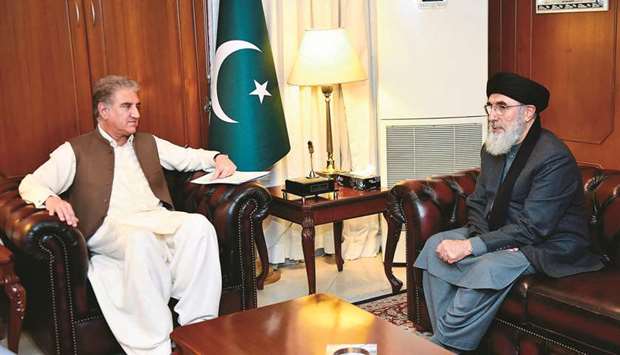Afghan leader of Hezb-e-Islami Gulbuddin Hekmatyar held talks with Foreign Minister Shah Mahmood Qureshi yesterday. They discussed bilateral relations and the Afghan peace process.
Hekmatyrar is on a three-day visit.
He said Afghans think of Pakistan as their second home, a statement issued by the Foreign Office said. Hekmatyar made these comments during a meeting with Foreign Minister Shah Mahmood Qureshi at the Foreign Office.
A Foreign Office statement quotes the foreign minister as saying that Pakistan will continue to play the role of a facilitator in the Afghan peace process.
“Prime Minister Imran Khan has said lasting peace can only be achieved through a political settlement accepted by the people of Afghanistan,” Qureshi said, adding that he was pleased that Islamabad’s stance was now being recognised by the world.
“Intra-Afghan talks provide a unique opportunity to the leadership for establishing lasting peace in the country,” the foreign minister said.
During his visit, the Afghan leader is expected to meet President Dr Arif Alvi and Prime Minister Imran Khan in addition to Senate Chairman Sadiq Sanjrani and National Assembly Speaker Asad Qaiser among others.
He is also expected to speak at a programme of a policy think-tank where he will interact with the media.
In a statement issued on Sunday, the Foreign Office had said Hekmatyar’s visit would provide an opportunity for exchanging views on the Afghan peace process, strengthening bilateral relations as well as people-to-people interaction.
Hekmatyar, who twice served as Afghan prime minister in 1990s, had recently said that India, due to its rivalry with Pakistan, was dissatisfied with the peace process in Afghanistan and alleged it had started supporting local militias to act as spoilers of the peace process.
“China and Pakistan have a common and coordinated position on Afghanistan and not only do they support the peace process, rather they see it as beneficial for their regional interests, especially if it leads to a reduction in India’s presence in Afghanistan,” the Afghan leader had said.
Hekmatyar’s visit comes a few weeks after Chairman of Afghanistan’s High Council for National Reconciliation Dr Abdullah Abdullah visited Pakistan.
Hours before returning to Kabul after completing his three-day visit, the Afghan leader had said: “We had good discussions, extensive discussions with authorities, civilian and military, and in most of the cases, for example on the need for reduction in violence, the need for getting to ceasefire, on the need for showing flexibility we are on the same page.”
Abdullah’s visit, his first to Pakistan in his new role, was meant to seek Islamabad’s cooperation for what he had said in his speech at the Institute of Strategic Studies, Islamabad “to see the process through to the next stage”.
For that to happen an equal emphasis was placed by both sides on exploring possibilities for improving Pak-Afghan bilateral ties that had been marred by mistrust and acrimony for a long time.
Both sides, by the end of the visit, suggested that ground had been prepared for turning the page in bilateral relations.

Foreign Minister Shah Mahmood Qureshi (left) with veteran Afghan politician and Hezb-i-Islami leader Gulbuddin Hekmatyar during the latter’s visit to the Foreign Ministry in Islamabad yesterday. (AFP)
